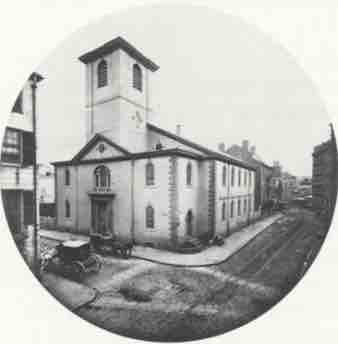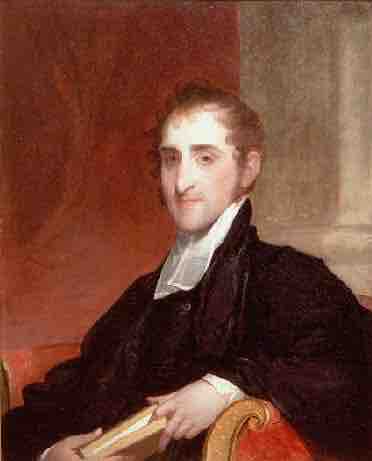Unitarianism
Unitarianism is a Christian theological movement named for its understanding of God as one person (in direct contrast to Trinitarianism, which defines God as three persons coexisting as one in being). Thus, Unitarians adhere to strict monotheism, maintaining that Jesus was a great man and a prophet of God but not God himself. Unitarianism began in Poland and Transylvania in the late sixteenth century and had reached England by the mid-seventeenth century.
As early as the middle of the eighteenth century, a number of clergymen in New England preached what was essentially Unitarianism. The most prominent of these men was Jonathan Mayhew (1720–1766), pastor of the West Church in Boston, who preached the strict unity of God, the subordinate nature of Christ, and salvation by character. Charles Chauncy (1705–1787), pastor of the First Church from 1727 until his death, was both a Unitarian and a Universalist.
The first official acceptance of the Unitarian faith on the part of a congregation was by King's Chapel in Boston, which revised the prayer book into a mild Unitarian liturgy in 1785. From 1725 to 1825, Unitarianism gained ground in New England and other areas. Beginning in 1805, Unitarian books appeared by John Sherman and Noah Worcester. At the beginning of the nineteenth century, with one exception, all of the churches of Boston were occupied by Unitarian preachers, and various periodicals and organizations expressed Unitarian opinions. Churches were established in New York, Baltimore, Washington, Charleston, and elsewhere during this period.

The Brattle Street Church in Boston, ca. 1859
Boston was the center of Unitarian activity in America, and the Brattle Street Church was a prominent Unitarian venue.
The period of American Unitarianism from about 1800 to 1835 can be thought of as formative, mainly influenced by English philosophy, semi-supernatural, imperfectly rationalistic, and devoted to philanthropy and practical Christianity. In 1800, Joseph Stevens Buckminster became minister of the Brattle Street Church in Boston, where his sermons and literary activities helped shape the subsequent growth of Unitarianism in New England. Unitarian Henry Ware was appointed as the Hollis professor of divinity at Harvard College in 1805, and Harvard Divinity school then shifted from its conservative roots to teach Unitarian theology.

Rev. Joseph Stevens Buckminster, influential Unitarian preacher
Joseph Buckminster's preaching and texts greatly influenced American Unitarian thought.
Buckminster's close associate William Ellery Channing became the leader of the Unitarian movement. At first mystical rather than rationalist in his theology, he took part with the "Catholic Christians," as they called themselves, who aimed at bringing Christianity into harmony with the progressive spirit of the time. His essays, "The System of Exclusion and Denunciation in Religion" (1815) and "Objections to Unitarian Christianity Considered" (1819) made him a defender of Unitarianism.
The result of the "Unitarian Controversy" in 1815 was a growing division in the Congregational churches, which was emphasized in 1825 by the formation of the American Unitarian Association at Boston. The association published books, supported poor churches, sent out missionaries, and established new churches in nearly every state.
Universalism
The Universalist Church of America, which held that all human beings may be saved through Jesus Christ and would come to harmony in God's kingdom, emerged in the late eighteenth century from a mixture of Anabaptists, Moravians, liberal Quakers, and people influenced by Pietist movements such as Methodism. Americans from these religious backgrounds gradually created a new denominational tradition of Christian Universalism during the nineteenth century. The Universalist Church of America grew to be the sixth-largest denomination in the United States at its peak.
John Murray, who is called the "Father of American Universalism," was a central figure in the founding of the Universalist Church of America in 1793. He served as pastor of the Universalist Society of Boston and wrote many hymns. Another important figure in early American Christian Universalism was George de Benneville, a French Huguenot preacher and physician who was imprisoned for advocating Universalism and later emigrated to Pennsylvania, where he continued preaching on the subject. Noted for his friendly and respectful relationship with American Indians and his pluralistic and multicultural view of spiritual truth, George de Benneville was well ahead of his time.
Other significant early modern Christian Universalist leaders included Elhanan Winchester, a Baptist preacher who wrote several books promoting the universal salvation of all souls after a period in purgatory and founded a church that ministered to African-American slaves in South Carolina; Hosea Ballou, a Universalist preacher in New England; and Hannah Whitall Smith, a writer and evangelist from a Quaker background who was active in the women's suffrage and temperance movements.